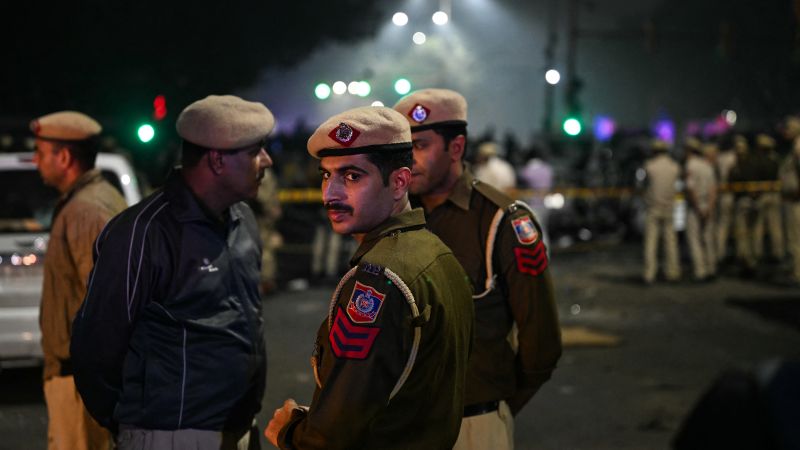Copyright Cable News Network

In a bustling Delhi neighborhood, forensics teams combed through the charred skeleton of a car. Less than 24 hours later, the air outside Islamabad’s judicial complex was thick with the aftermath of a suicide bomb. The two deadly attacks are separate, and no evidence currently links the two. But for the two South Asian rivals, the political shockwave caused by the blasts are a stark reminder of the lingering security issues that fester below the surface throughout the region. Explosions in their heavily fortified capitals are a rarity, and two in as many days have put officials in India, Pakistan and Afghanistan on edge, potentially reigniting a cycle of suspicion and blame after what has already been a tense year for all countries. A suicide bombing in Islamabad on Tuesday killed at least 12 people and injured 20 more, marking the deadliest such attack to strike the Pakistani capital in nearly two decades. It came just a day after a rare car explosion tore through a historic Delhi neighborhood, killing at least 10 and leaving more than a dozen wounded. The twin tragedies have handed political hardliners in both New Delhi and Islamabad a potent weapon, ratcheting up domestic pressure on each government to act decisively. The blame game ignited almost immediately. Pakistan’s Prime Minister Shehbaz Sharif, without providing evidence, accused “Indian terrorist proxies” for the Islamabad attack, claiming it was “backed by India” from Afghan soil. New Delhi fired back, rejecting the “baseless and unfounded allegations” as “desperate diversionary ploys.” Addressing the Delhi blast, Indian Prime Minister Narendra Modi vowed to bring “all those responsible… to justice.” He labeled the incident a “conspiracy” but stopped short of officially designating it a terror attack. New Delhi has not named Pakistan in connection with the explosion, and authorities have so far remained tight lipped as to who they believe might be responsible. But in past attacks, India has frequently pointed the finger at Islamabad, which is what makes this week’s twin attacks potentially fraught. “We are witnessing an increasingly fragile security environment across South Asia,” said Farwa Aamer, director of South Asia Initiatives at the Asia Society Policy Institute. “South Asia cannot afford further confrontation; the region is being held together by fragile ceasefires with no long-term resolution. What’s needed now is restraint, reflection, and a commitment to reset the regional course toward stability.” Secure capitals While both India and Pakistan have historically faced significant security threats, their capitals are meant to be fortresses – home to the seats of government, military leadership, and the diplomatic corps. In Delhi, the attack struck near the iconic Red Fort, a landmark and tourist hub teeming with crowded bazaars and street vendors. It came hours after police found thousands of kilograms of explosives from a village in Faridabad, a city just outside New Delhi. A senior Faridabad police official confirmed to CNN that police are investigating whether the recovery of these explosives was linked to the Red Fort blast. Police in Delhi, Jammu and Kashmir, Uttar Pradesh and Haryana have been conducting a joint operation across these states, the source said. Modi has built his brand on a muscular national security policy, casting himself as the nation’s “watchman” and opposition politicians immediately seized on the alleged security lapse. “If the country is not safe… if the people are not safe… Questions will be asked,” Supriya Shrinate, a national spokesperson for the Indian National Congress, told local news agency ANI. She criticized the prime minister for traveling to Bhutan a day after the attack. “People… are starting to feel that the country is not in strong hands,” she said. Across the border in Islamabad, the explosion occurred in the parking lot of the judicial complex, an area situated within a district that is home to numerous high-ranking government officials. Pakistan experiences chronic instability at the hands of militants, but Islamabad rarely witnesses such attacks thanks to a heavy security presence with Tuesday’s explosion being the deadliest to strike the capital since 2008. “I’ve been carrying a heavy burden and a great distress in my mind,” advocate Jaseem Ahmed Bhutto, who witnessed the attack, told Reuters. “It’s a sense of confusion and concern that if the courts, where every ordinary and prominent person goes and where cases are resolved, are not safe, then who is safe in this city?” Jamaat-ul-Ahrar (JuA), a splinter group of the militant Pakistani Taliban (TTP) behind some of the country’s deadliest attacks over the past decade, claimed responsibility for the bombing in a statement seen by CNN. The TTP, however, distanced itself, according to its spokesman Mohammad Khursasani. The bombing prompted a furious response from the government. Defense Minister Khawaja Asif declared a “state of war” and described the attack as a “wake-up call” regarding Afghanistan – a reference to Pakistan’s allegation that militant safe havens on Afghan soil are the source of its problems. Pakistan has faced a surge in militant violence since the Afghan Taliban seized power in Kabul in 2021, fueling cross-border tensions that recently erupted into the worst clashes the two countries have seen in years.Recent talks in Qatar and Istanbul aimed at ending the latest cross-border fighting in have made little progress. The Afghan Taliban have denied backing the Pakistani Taliban and expressed “deep sorrow and condemnation” regarding Tuesday’s attack in Islamabad. According to Fahd Humayun, an assistant professor of political science at Tufts University, this year “has been particularly bad” for Pakistan and Afghanistan, “not just in terms of the loss of life of Pakistani soldiers, but many officer ranked personnel.” This, he noted, is something “the political and military leadership in Pakistan has taken very seriously.” ‘A moment of great volatility’ The cycle of accusations and hyperbole following attacks in India and Pakistan is a well-documented political pattern. And while this rhetoric serves both government’s political needs, it also has the potential to push the countries into dangerous standoffs. This week’s attacks come “in a moment of great churn and volatility in South Asia,” according to South Asia analyst Michael Kugelman. With Pakistan blaming Taliban-backed militants it sees as being sponsored by India, the situation could escalate, he said. “We’re looking at a potential crisis that could engulf not two but three countries of South Asia: Pakistan, Afghanistan, and India,” Kugelman added. This blame game is fueled by deep-seated narratives on both sides. For years, Pakistan has accused India of sponsoring terrorism on its soil, claiming that Indian intelligence uses Afghanistan as a base to support anti-Pakistan militants like the TTP. At the same time, India has long accused Pakistan of supporting and harboring militants that carry out attacks. Both sides deny each other’s accusations. Pakistan’s blaming of India for Tuesday’s suicide attack comes just months after the two nuclear-armed rivals engaged in their most intense fighting in decades: a four-day conflict in May featuring clashes with fighter jets, missiles, and drones. That deadly conflict was triggered by a massacre at a scenic mountain spot in India-administered Kashmir, when gunmen killed 26 people, mostly Indian tourists. Following a familiar script, India blamed Pakistan for the attack, a charge Islamabad denied. Modi redefined India’s policy on terrorism in the aftermath, which now says that any attack on Indian soil will be considered “an act of war.” New Delhi launched airstrikes against its neighbor, which prompted a swift military retaliation from Pakistan. According to Humayun, many in Pakistan might have been watching the aftermath of the Delhi blast with “bated breath,” anxious to see if the familiar finger-pointing from India would begin. He highlighted the initial “restraint on the Indian side” as a departure from that script. But if the Indian government suggests the blast was a terrorist attack, “the public will likely expect something big in response from the Indian government,” Kugelman said. “That said, I don’t think there will be as much pressure on New Delhi.” India’s principal counter-terrorism body, the National Investigation Agency, has taken over the probe. As governments separately attempt to get to the bottom of both attacks, the citizens of Delhi and Islamabad are left cleaning up the debris and mourning their dead. Both capitals had, for years, been largely “insulated from these kinds of incidents,” Humayun said. That they can now occur in these cities suggest that this type of vulnerability “is no longer just a symptom of the hinterland. It’s coming to major metropolises.”



